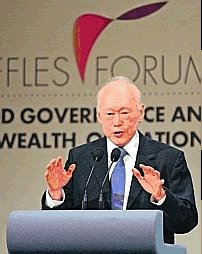Historical baggage
This is another example of the historical baggage of Malaysia and Singapore ever since they split in 1965 due to differences over their political systems.
Malaysia's Deputy Prime Minister Najib Razak made the comments below as a rebuttal to Singapore's Minister Mentor Lee Kuan Yew's earlier comments about its predominantly Muslim neighbours at the Raffles Forum organised by the LKY School of Public Policy during the IMF/World Bank week. Malaysia chides Singapore's Lee over race comments
Malaysia chides Singapore's Lee over race comments
KUALA LUMPUR, Sept 21 (Reuters) - Malaysia denied on Thursday that it mistreated its ethnic Chinese minority, responding to criticism from former Singapore leader Lee Kuan Yew.
"It's a comment that we can do without. It is not appreciated at all," Malaysian Deputy Prime Minister Najib Razak said, referring to recent remarks made by Lee.
Lee told a forum in Singapore last Friday that it was vital for Singapore, a predominantly ethnic Chinese state, to stand up to its bigger, mainly Muslim neighbours, Indonesia and Malaysia.
"Our neighbours both have problems with their Chinese. They are successful. They are hard-working and therefore they are systemically marginalised," Lee said.
Singapore and Malaysia have deep economic ties, but diplomatic relations are often strained. The two countries briefly united as one country in 1963 but separated two years later in a falling out related to racial politics.
Indonesia and Malaysia "want Singapore, to put it simply, to be like their Chinese -- compliant", said Lee, who was Singapore's prime minister from 1965 to 1990.
Najib said Malaysia did not marginalise ethnic Chinese or Indians in favour of majority ethnic Malays, who are known as bumiputras (sons of the soil).
"Malaysia does not practise a policy of blocking opportunities for non-bumiputras to progress further," he said.
Who's right? Well, the situation is not so simple in the two neighbouring countries.
Yes, the Chinese are marginalised in predominantly Malay Malaysia. Not through direct blocking of opportunities for non-Malays as mentioned by Najib, but through the unfair and exuberant promotion of Malay interests.
Yes, the Malays are seen to be marginalised in predominantly Chinese Singapore. After all, there are few key positions in Singapore that are held by Malays.
Is there true or absolute meritocracy in the two countries? Not at all.
Malays have an unfair advantage over non-Malays in Malaysia as part of the affirmative action policy called bumiputra policy, which should have expired in 1990. It's still going strong. No wonder so many Malaysian Chinese move to Singapore in search of true meritocracy.
But is there real meritocracy in Singapore? To a certain extent, yes. The government has always tried to attract the best talent, regardless of race or nationality. But there will always be rumblings on the ground about the influx of "foreign talent" into the country.
Does Singapore need its own bumiputra policy to safeguard its locals?




No comments:
Post a Comment